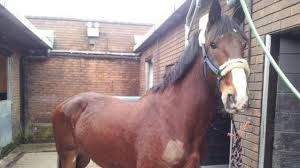
Interesting story in the Daily Mail today about the row over whether a police horse called Brian should be allowed to keep his name… Apparently, the name Brian is too ‘soft’ and police horses need hard, tough, ‘war-like’ names. According to the police force, nobody wants to be protected by an animal called Brian and if rioters are to be controlled by policemen on horseback, then the horses would have to have far more fierce names. (Like a rioter would stop to ask the horse its name anyway!)
The main fuss has been over the name itself, with a flurry of complaints from human Brians worldwide. But surely the question we should be asking is this: why do police horses have to have ‘war-like’ names? Are the police expecting a war? Hmmm.
(And, yes, that is actually Brian in the photo. Just in case you were wondering.)

BYPASS THE CENSORS
Sign up to get unfiltered news delivered straight to your inbox.
You can unsubscribe any time. By subscribing you agree to our Terms of Use
The Daily Mail‘s report goes like this:
A one-tonne, 6ft-tall police horse called Brian is set to keep his name, despite fears it needs to be called something tougher to face rioters.
Thames Valley Police said Brian is an unsuitable name for a horse and mooted calling the six-year-old something more ‘war-like’, such as Hercules or Caesar.
But the force has now backed down, following protests from other men called Brian, who said the possible change would be a slur on their good name.
A spokesman for the force said: ‘Following a lot of protests, it looks like Brian may keep his name.’
Brian Belo, the winner of Big Brother series eight, said ‘This is a victory for Brians everywhere.
‘It’s a solid name and a strong name – think of Monty Python’s The Life of Brian, about Jesus.
‘I think it’s a marvellous name for a horse, it’s a friendly name, you would want to be kept safe by a Brian.’
The force had admitted that its usual policy was to give their horses ‘macho’ names such as Thor or Odin. One mare called Mary became Luna, and another horse called Red became Trojan, it said.
But dozens of Brians soon began posting comments about the name online, questioning why it was not ‘strong enough’ for a horse.
It led to a growing campaign, with many using the hashtag #IamBrian to show their support to the horse.
Among those who complained was Brian Lewis from Ascot, who said: ‘I think it’s outrageous. Brian is a good name for a horse.’
And Brian Poulson, from Bracknell in Berkshire, said he was ‘appalled’ at the police name-change plan.
‘There is no way they should be changing it…every horse should be called Brian!’
The shire horse must now pass six weeks of training before he is kept on by the force.
The tests include Brian going out on patrol in town centres and tests to see if he can cross bridges and trot through underpasses.
The force originally said that, if he passed the test, Brian would be scratched from the records and replaced with a more ‘fitting’ name. It said that Brian needed a more ‘God-like’ name to face rioters or troublesome football crowds.
But a force spokesman told MailOnline today that Brian was not certain to keep his name but that it was ‘likely’.
He said the decision would be made once the horse has passed his training.
Brian was chosen from The Stables Equestrian Centre in Wilstead, Bedfordshire, where he had been since 2013.
He has been taken on to replace Pluto, a seven-year-old shire horse, who suffered from peritonitis and died suddenly in his stables six months ago.
PC Kirsty Wilson, of the Mounted Section, said Brian is so far doing well in the tests.
She said: ‘He has seen a lot of hazards – things you would expect to scare normal horses.
‘With a horse, even pushchairs can be a hazard because they are not something they would normally see on a regular basis.
‘A horse can have many personality changes in a six-week period, but so far Brian has not put a hoof wrong.’
She added: ‘I am 50/50 with him at the moment. He is certainly on his way and so far he has not given us any reason to doubt him, but it is very early days.’

